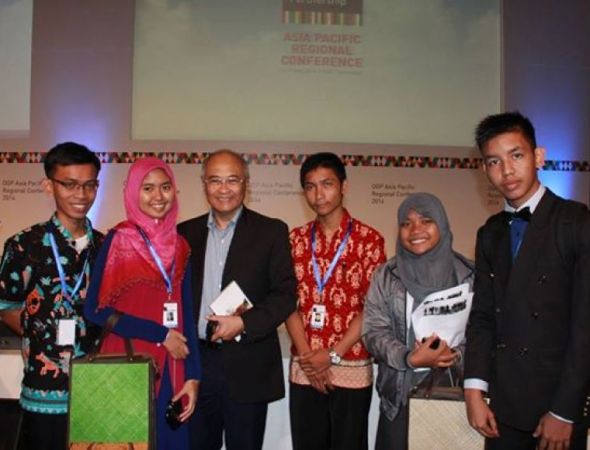Bridging the Gap Engaging Children and Youth Participation in Vital Decision Making Process
Discussion details
“I am out of this place”. That is how we probably feel if we are a teenager who shares a big conference room with world leaders, scholars, corporate leaders, journalists, and many other prominent figures.
The worst part is they don’t speak your mother-tongue nor do you speak their language.You speak very little English and have to rely on your chaperone to translate for you.You have to sit there, listening to what the speakers say for hours before having the chance to raise questions that are racing in your mind. Another bigger challenge is the discussion topic. They discuss development and future and welfare!
If we are not passionate about the topic, we would get bored and fall asleep pretty soon. Which is why we need to applaud a number of youth delegates who attended and engaged in development agenda discussion at the Open Government Partnership Asia Pacific Regional Conference in Nusa Dua, Bali, last May.
Open Government Partnership (OGP) is a group of countries who voluntarily commit to open access and communication between the government and citizens for the greater good. There are four supporting pillars to make it happen, which are accountability, transparency, citizen participation, and technology and innovation. The partnership held a regional conference for the first time and invited all layers of society, including youth representatives from the Asia Pacific region.
Key points
Development budget, agenda, corruption eradication, welfare, and policy are not the most common issues discussed by teenagers. However, it affects our everyday life and these are some key points of OGP conference sessions. Kinanthi, Rima, Anto, Agus, Fajar, Fadhil, and Ikhsan dare to take the challenge and participated in these discussions. The most special thing about them is that they represent grass roots communities who rarely have the opportunity to make their voices heard.
These seven future leaders represent various children forums which are facilitated by WahanaVisi Indonesia – a non-profit organization focusing on children's well-being. The Super Seven’s goalis to learn about development and how they can participate in creating a better future for the country.After the conference ended, we can say they scored really well!
“I wasn’t confident when I joined this conference at first because I can’t speak English. Thankfully, my limitations don’t hold me back to learn a lot here. I got great insights from the Citizen Participation Measurement session as it is in-line with my children's forum project in Pontianak. We make a child-led research to help the provincial government understand children needs in numerous villages across West Kalimantan province. I understand that without transparency, a country cannot progress well”, said Agus who is also the President of West Kalimantan Children Forum, Foranchika.
Another delegate, Rima from PondokGede - Jakarta, beamed with excitement as she finished a class on Opening Up: Inspiring Stories from Transparent and Accountable Local Governments.
“I am amazed at the city of Bandung progress ever since they have a new mayor. I met him on one of the OGP sessions and he explained his development plan to the audience. I envy the citizens of Bandung now”, she said.
Her excitement is understandable because Bandung Mayor Ridwan Kamil had shown how he set up official Twitter accounts for all Bandung city departments within one week after he took the mayor office. That way, citizens can just send a twit-picture mentioning the related department if anything goes wrong. It could be a simple report like damaged road, missing pot-holes, and even broken tree-trunks causing traffic jam. Bandung government also set up 5000 free WiFi hotspot to make sure the citizens can be connected with each other and with the government officials at all time.
Meaningful
Attending open dialogues and multi-stakeholders conference like this can build trust, confidence, and knowledge for the young generation. Most importantly, by engaging children and youth in meaningful participation, we bridge many gaps, generation gaps, welfare gaps, and knowledge gaps. By opening the opportunity to listen to their voices and aspirations, society and government can build better development agenda based on collective needs – covering both local and national levels.
A simple case happened in a district in one of the islands east of Bali when two boys failed to obtain their junior high school graduation certificates because they complained to the school officials in public on the National Children Day celebration in 2012. Each student in the area is required to bring a gallon of water to school if they want to attend the class, failing which, they're punished.
These two students expressed that it was a burden and said they hoped the requirement would be eliminated in the new academic year. Their request cost them their graduation certificates. Wahana Visi Indonesia then helped by facilitating dialogue between the school officials and the students and ensured the school gave the students their basic rights. It worked, but the process wasn’t a smooth journey.
Even though, many Indonesian are internet literate, a lot more do not have access to share our concern to the authorities. A lot of us do not know how to report injustice or possible corruption cases securely – without fear of retaliation.
As Rakesh Rajani, OGP Civil Society Organization Lead Chair, said on his opening remarks,"Open government also protect those who criticize them." Indonesian youth need to know that they have the rights to make their ideas known and have their rights protected at the same time.
(by Shintya Kurniawan, World Vision International)



Log in with your EU Login account to post or comment on the platform.